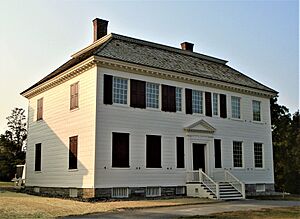Johnson Hall State Historic Site facts for kids
|
Johnson Hall
|
|

A 1903 painting despicts the presentation of medals to the Six Nations Iroquois Confederacy in 1772
|
|
| Location | Johnstown, New York |
|---|---|
| Built | 1763 |
| Architect | Peter Harrison (1716-1775) |
| Architectural style | Georgian |
| NRHP reference No. | 66000520 |
Quick facts for kids Significant dates |
|
| Added to NRHP | October 15, 1966 |
| Designated NHL | October 9, 1960 |
Johnson Hall State Historic Site was the home of a very important person named Sir William Johnson. He was an Irish pioneer who lived from 1715 to 1774. Sir William became a powerful British leader in charge of Native American affairs in the New York area. He was especially known for his strong friendships with the Mohawk people and other groups in the Iroquois League.
Today, Johnson Hall is located in Johnstown, New York. You can find it at Hall Avenue, West State Street, and Johnson Avenue.
Contents
The History of Johnson Hall
Building a New Home
Sir William Johnson built his new home about seven miles from the Mohawk River. It was also close to Hall Creek. This creek was important because it provided enough water to power a sawmill and later a grist mill.
The house was made of wood, but its outside was covered with planks that looked like stone. Sir William hired a famous architect named Peter Harrison to design the house. A carpenter named Samuel Fuller helped build it. Some ideas for the house came from a magazine called Builders' Companion.
Defending the Frontier
Sir William also had two stone block houses built. These were for defense against attacks on the frontier, which was the edge of the settled areas. The British had just finished a big war with the French, called the Seven Years' War. The stone houses were also used for storage and other everyday needs.
Sir William's Estate
Sir William Johnson founded the city of Johnstown, New York. He eventually owned a huge estate of about 400,000 acres. He moved to Johnson Hall in 1763 from his old home, Old Fort Johnson. He lived at Johnson Hall until he passed away in 1774.
Changes After the Revolution
After Sir William died, his son, John Johnson, inherited the house. However, during the American Revolution, the Johnsons were Loyalists. This meant they supported the British king. Because of this, they went to Canada.
In 1779, the new government in New York took over Johnson Hall. They later sold the house to a man named Silas Talbot.
Becoming a Historic Site
Johnson Hall was used as a private home by different owners for many years. Then, in 1906, the state of New York bought it. They wanted to protect it and open it as a house museum. This was because Sir William Johnson was one of the most important landowners in the state during colonial times.
The house was repaired and restored in the early 1900s and again in the 1950s. These efforts removed later additions and made the house look more like it did when Sir William lived there. The historic site now covers more than 18 acres of land. Only the main mansion and the West Stonehouse are original buildings. The East Stonehouse is a newer copy.
In 1960, Johnson Hall was recognized as a National Historic Landmark. This means it is a very important historical place in the United States.
See also
 | Aurelia Browder |
 | Nannie Helen Burroughs |
 | Michelle Alexander |




